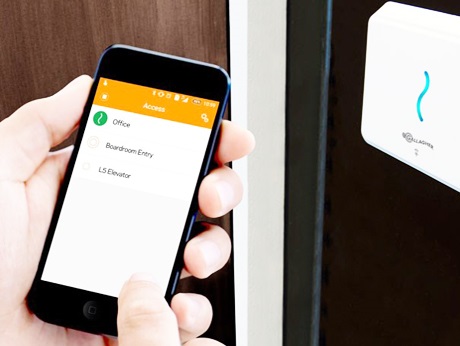
|Bangalore, January 18 , 2017: By 2020, 1 in 5 corporates will use smartphones in place of traditional physical access cards, finds a Gartner study.
In 2016, less than 5 percent of organizations used smartphones to enable access to offices and other premises.|
Says Gartner Research Director David Anthony Mahdi: "A significant fraction of organizations use legacy physical access technologies that are proprietary, closed systems and have limited ability to integrate with IT infrastructure. Today, the increasing availability of mobile and cloud technologies from many physical access control system (PACS) vendors will have major impacts on how these systems can be implemented and managed."
PACS technology is widely deployed across multiple vertical industries and geographies to secure access to a wide range of facilities (buildings, individual offices, data centers, plant rooms, warehouses and so on), ensuring that only entitled people (employees, contractors, visitors, maintenance staff) get access to specific location
__________________________________________________________________________________________________________________________________________________
Mobile phone access is already here: In December 2016, leading New Zealand based technology manufacturer, Gallagher, announced the global release of its latest state-of-the-art mobile security solution: Gallagher Mobile Connect. Harnessing Bluetooth wireless technology and the power of smart phones, Mobile Connect transforms a mobile phone in to an access device – empowering businesses to use mobile technology in place of traditional access cards. Using two-step remote provisioning, Mobile Connect delivers secure enrolment by sending an email invitation with SMS code to verify the user and mobile device. This creates further administration efficiencies by removing the need to physically deliver an access card.Optional two-factor authentication, either PIN or biometric, provides added security and flexibility for sites using Mobile Connect.
The Gallagher Mobile Connect App allows you to use your mobile device just like an access card. Mobile Connect is freely downloadable from the Apple App and Google Play stores.
--------------------------------------------------------------------------------------------------------------------------------------------------------------------------------------------------------------------------------------------------
Mobile technology is already widely used for logical access control. Phone-as-a-token authentication methods continue to be the preferred choice in the majority of new and refreshed token deployments as an alternative to traditional one-time password (OTP) hardware tokens. Gartner projects that the same kinds of cost and user experience (UX) benefits will drive increasing use of smartphones in place of discrete physical access cards. Smartphones using technologies and protocols such as Bluetooth, Bluetooth LE, and Near Field Communication can work with a number of readers and PACS technology.
One of the easiest ways to use a smartphone's access credentials is to integrate them — via a data channel over the air or via Wi-Fi — into the access control system (ACS) and "unlock the door" remotely (just as an ACS administrator can). This approach requires no change to reader hardware.
Using smartphones can also simplify the integration of biometric technologies. "Rather than having to add biometric capture devices in or alongside readers, the phone itself can easily be used as a capture device for face or voice (or both), with comparison and matching done locally on the phone or centrally," adds Mahdi. "This approach also mitigates the risks from an attacker who gains possession of a person's phone."
The technology's limitations remain a challenge. For example, there's significant disparity in functionality between smartphones, and some security and risk management leaders should be aware that their physical card readers and PACS might require a significant upgrade to use smartphones for physical access. "Nevertheless, replacing traditional physical access cards with smartphones enables widely sought-after cost reductions and UX benefits," says Mahdi.